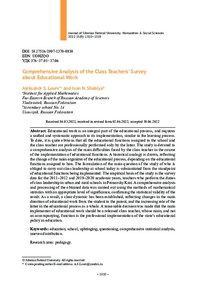Комплексный анализ опроса классных руководителей о воспитательной работе
Скачать файл:
URI (для ссылок/цитирований):
https://elib.sfu-kras.ru/handle/2311/148212Автор:
Лосев, А. С.
Шабля, И. Н.
Losev, Aleksandr S.
Shablya, Ivan N.
Дата:
2022-09Журнал:
Журнал Сибирского федерального университета. Гуманитарные науки. Journal of Siberian Federal University. Humanities & Social Sciences; 2022 15 (9)Аннотация:
Воспитательная работа как неотъемлемая часть образовательного
процесса требует единого и системного подхода к её выполнению аналогично
процессу обучения. Сегодня уже очевидно, что все воспитательные функции,
возложенные на школу и классного руководителя, профессионально выполняются
только последним. Исследование посвящено комплексному анализу основных
трудностей, возникающих перед классным руководителем в ходе реализации
воспитательных функций. Проведена историческая аналогия, отражающая смену
главного организатора воспитательного процесса в зависимости от возлагаемых
на него функций. Обоснована постановка ключевого вопроса исследования о том,
кто обязан в школе осуществлять классное руководство с позиции реализуемых
воспитательных задач. Эмпирической основой исследования послужили итоги
анкетирования за 2011–2012 и 2019–2020 учебные годы учителей, выполняющих
обязанности классного руководства в городских и сельских школах Приморского
края. Проведены комплексный анализ и обработка полученных данных с помощью
методов математической статистики с соответствующим уровнем значимости,
подтверждающим статистическую обоснованность результата. Установлена
явная динамика, отражающая перенаправление вектора воспитательной работы
с обучающегося на родителя и возрастание роли последнего в образовательном
процессе в целом. Сделан однозначный вывод, что основным реализатором
воспитательной работы должен быть освобожденный классный руководитель,
у которого базовой, а не сопутствующей функцией станет профессиональная
реализация воспитательной политики государства в образовании Educational work is an integral part of the educational process, and requires a unified and systematic approach to its implementation, similar to the learning process. To date, it is quite obvious that all the educational functions assigned to the school and the class teacher are professionally performed only by the latter. The study is devoted to a comprehensive analysis of the main difficulties faced by the class teacher in the course of the implementation of educational functions. A historical analogy is drawn, reflecting the change of the main organizer of the educational process, depending on the educational functions assigned to him. The formulation of the main question of the study of who is obliged to carry out class leadership at school today is substantiated from the standpoint of educational functions being implemented. The empirical basis of the study is the survey data for the 2011–2012 and 2019–2020 academic years, teachers who perform the duties of class leadership in urban and rural schools in Primorsky Krai. A comprehensive analysis and processing of the obtained data was carried out using the methods of mathematical statistics with an appropriate level of significance, confirming the statistical validity of the result. As a result, a clear dynamic has been established, reflecting changes in the main direction of educational work from the student to the parent, and the increasing role of the latter in the educational process as a whole. A reasonable decision was made that the main implementer of educational work should be a released class teacher, whose main, and not an accompanying, function is the professional implementation of the state’s educational policy in education

